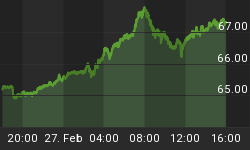What a wild day on stock markets yesterday! At one stage the Dow Jones Industrial Average plunged to below 8,000 to a five-year intraday low, but staged a spectacular rally late in the session to close 553 points (6.6%) up on the day. The S&P 500 Index moved in tandem to finish the day 59 points (6.9%) higher.
I referred to the characteristics of the so-called descending triangle on the S&P 500 in a post of two days ago ("Stock Markets: Which Way José?"), mentioning that a reversal to the upside often leads to a strong countertrend rally. A move in that direction occurred yesterday on the highest volume in a month. Although one shouldn't get too fired up about a one-day turnaround, the price and volume action was quite impressive, with the October 27 lows (8,176 on the Dow and 849 on the S&P 500) still intact.
The following daily graph summarizes the market action:

Importantly, the intraday lows of October 10, when the NYSE (red line in the graph below) made an "internal low" with 92.7% of stocks hitting new lows (blue area), have also not yet been violated.

A further positive for the bulls is that, according to Jeffrey Hirsch (Stock Trader's Almanac), the Dow has been up 12 out of the last 14 years during the week before Thanksgiving.
With the likelihood of further short-term gains a possibility (especially if the major indices record upside reversals on the weekly data by the end of today), it remains too early to tell whether a secular low has been recorded. The chart below shows the long-term trend of the S&P 500 Index (green line) together with a simple 12-month rate of change (or momentum) indicator (blue line). Although monthly indicators are of little help when it comes to market timing, they do come in handy for defining the primary trend. An ROC line below zero depicts bear trends as experienced in 1991, 1994, 2000 to 2003, and again since December 2007.

Stock markets are caught between the actions of central banks, governments and the IMF frantically fending off a total economic meltdown on the one hand, and a worsening economic and corporate picture on the other. This situation has a "no-man's-land" feel to it. By all means try to play a possible nascent rally, but be cognizant that, failing further technical and fundamental evidence, you are trading against the primary trend. Caution is still warranted!
Did you enjoy this post? If so, click here to subscribe to updates to Investment Postcards from Cape Town by e-mail.















